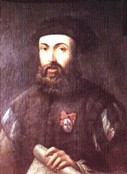Hernando Cortez
Gómara, Francisco López de
Francisco López de Gómara (1510-1566) was born in Seville and later retired there in 1557 where it is believed he also died. He was an ordained  priest and in 1540 he became the private and domestic chaplain to Hernando Cortez. He wrote a number of historical works including a general history of the Indies [332]. Prince Philip, later Philip II of Spain, banned all his works in 1553. The relevant chapter in Hispania Victrix, in which he expressed his views on Atlantis is available in English online(a), as is the original Spanish text(b).
priest and in 1540 he became the private and domestic chaplain to Hernando Cortez. He wrote a number of historical works including a general history of the Indies [332]. Prince Philip, later Philip II of Spain, banned all his works in 1553. The relevant chapter in Hispania Victrix, in which he expressed his views on Atlantis is available in English online(a), as is the original Spanish text(b).
>Gomara’s acceptance of Plato’s Atlantis narrative and the 9,000 years mentioned by him, brought him into conflict with the church authorities because it contradicted the church’s teaching of the day which proclaimed that the Earth could not be older than 5,000 years!<
Gómara, following the Spanish invasion of America, was probably the first, in 1553, to suggest that the newly discovered continent was either Atlantis itself or the land beyond it. He cited Plato to support the proposition that the Native Americans were survivors of Atlantis. This was an idea that was adopted by many of his contemporaries.
Gómara was certain that Christopher Columbus had read Plato’s Timaeus and Critias suggesting that they gave added impetus to his westward voyage of discovery.
(a) https://www.jasoncolavito.com/goacutemara-on-atlantis.html
(b) https://books.google.ie/books/about/Hispania_Victrix.html?id=yBt3FLK1eUcC&redir_esc=y
